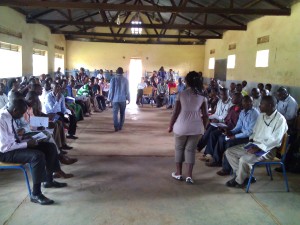Read About This Young Congolese Refugee Who's Empowering His Fellow Refugees
Requests: 0
Views: 6
COBURWAS International Youth Organization to Transform Africa (CIYOTA) is a Ugandan-based non-profit picture001 started by three refugee youth in secondary school to address the educational problems and other challenges faced by Congolese refugees living in the Kyangwali refugee camp. The nonprofit, launched in 2005, now has over 10,000 members and volunteers from over 40 African countries that subscribe to its goals.
Bahati Kanyamanza is one of CIYOTA’s founders and currently its Resource Director. He was forced to flee from the Democratic Republic of the Congo (DRC) into Uganda with other thousands of refugees in 1997. Like many others, he was placed in the Kyangwali refugee camp. The Ugandan government allocated farming land to supplement the refugee food resources received. However, Bahati and the other co-founders of CIYOTA did not want to become farmers, but wanted to address the key challenges facing the refugees living in the camp, especially lack of access to education. They launched CIYOTA in 2005, by building a primary school in the camp.
Almost ten years later, CIYOTA is registered as a nonprofit in Uganda, the DRC and the United States (U.S.). It runs multiple activities in Uganda, including livelihood programs, such as a microfinance project, providing women widowed by war small loans to start small businesses, as well as an anti-violence movement program aiming to equip young women, who never got an opportunity to go to school, with life skills, such as tailoring and adult education.
One of the nonprofit’s largest initiatives remains the primary school and an early childhood development (ECD) program, which provide quality education to refugee children in the camp, as there were two primary schools in the camp, which lacked appropriate conditions for proper schoolings. The classrooms were congested and the schools had no qualified teachers, which determined many children to drop out. The primary school set up by the nonprofit aimed not only to provide quality education, but act as a model for other refugee settlements. Given that land is owned by the Ugandan government, when setting up the school, CIYOTA worked to receive a piece of land from the Prime Minister office. The teachers are Ugandan citizens, who have gone through a training to teach at the primary level. The teaching positions are advertised on radio stations and interested candidates can apply and be interviewed at the school. Whoever qualifies joins the school on a contractual basis.
 (Photo courtesy of Taking on the Giant)
Currently, over 350 students are educated in the primary school. Now CIYOTA’s primary school is recognized by UNHCR as one of the best refugee initiatives in the world and was visited by UNHCR Deputy High Commissioner Alexander Aleinikoff in October 2014.
Apart from the primary school, CIYOTA is also providing housing for refugee secondary school students to be able to study in Hoima town, approximately 80 km from the refugee camp. There was only one secondary school in the Kyangwali refugee settlement, with only four classrooms and poor services, many students were dropping out or playing truant frequently. The dorms, which Bahati refers to as hostels, provide a home environment, where these students are groomed into future leaders of their communities...
To continue reading this article from our partner, Taking on the Giant, click here.
(Photo courtesy of Taking on the Giant)
Currently, over 350 students are educated in the primary school. Now CIYOTA’s primary school is recognized by UNHCR as one of the best refugee initiatives in the world and was visited by UNHCR Deputy High Commissioner Alexander Aleinikoff in October 2014.
Apart from the primary school, CIYOTA is also providing housing for refugee secondary school students to be able to study in Hoima town, approximately 80 km from the refugee camp. There was only one secondary school in the Kyangwali refugee settlement, with only four classrooms and poor services, many students were dropping out or playing truant frequently. The dorms, which Bahati refers to as hostels, provide a home environment, where these students are groomed into future leaders of their communities...
To continue reading this article from our partner, Taking on the Giant, click here.
 (Photo courtesy of Taking on the Giant)
Currently, over 350 students are educated in the primary school. Now CIYOTA’s primary school is recognized by UNHCR as one of the best refugee initiatives in the world and was visited by UNHCR Deputy High Commissioner Alexander Aleinikoff in October 2014.
Apart from the primary school, CIYOTA is also providing housing for refugee secondary school students to be able to study in Hoima town, approximately 80 km from the refugee camp. There was only one secondary school in the Kyangwali refugee settlement, with only four classrooms and poor services, many students were dropping out or playing truant frequently. The dorms, which Bahati refers to as hostels, provide a home environment, where these students are groomed into future leaders of their communities...
To continue reading this article from our partner, Taking on the Giant, click here.
(Photo courtesy of Taking on the Giant)
Currently, over 350 students are educated in the primary school. Now CIYOTA’s primary school is recognized by UNHCR as one of the best refugee initiatives in the world and was visited by UNHCR Deputy High Commissioner Alexander Aleinikoff in October 2014.
Apart from the primary school, CIYOTA is also providing housing for refugee secondary school students to be able to study in Hoima town, approximately 80 km from the refugee camp. There was only one secondary school in the Kyangwali refugee settlement, with only four classrooms and poor services, many students were dropping out or playing truant frequently. The dorms, which Bahati refers to as hostels, provide a home environment, where these students are groomed into future leaders of their communities...
To continue reading this article from our partner, Taking on the Giant, click here.
Reactions